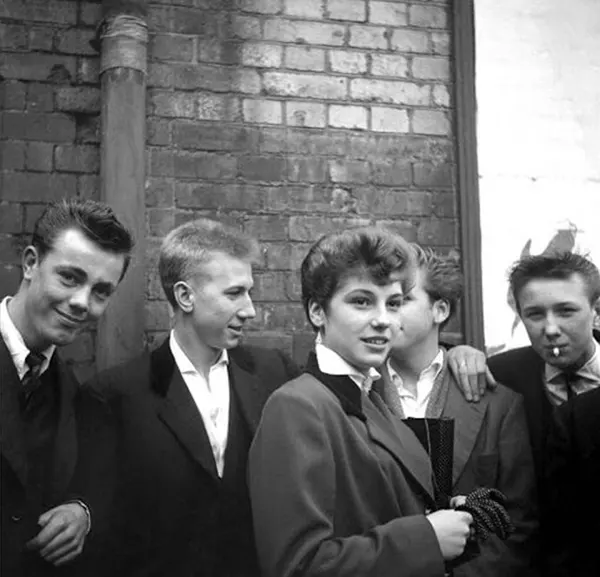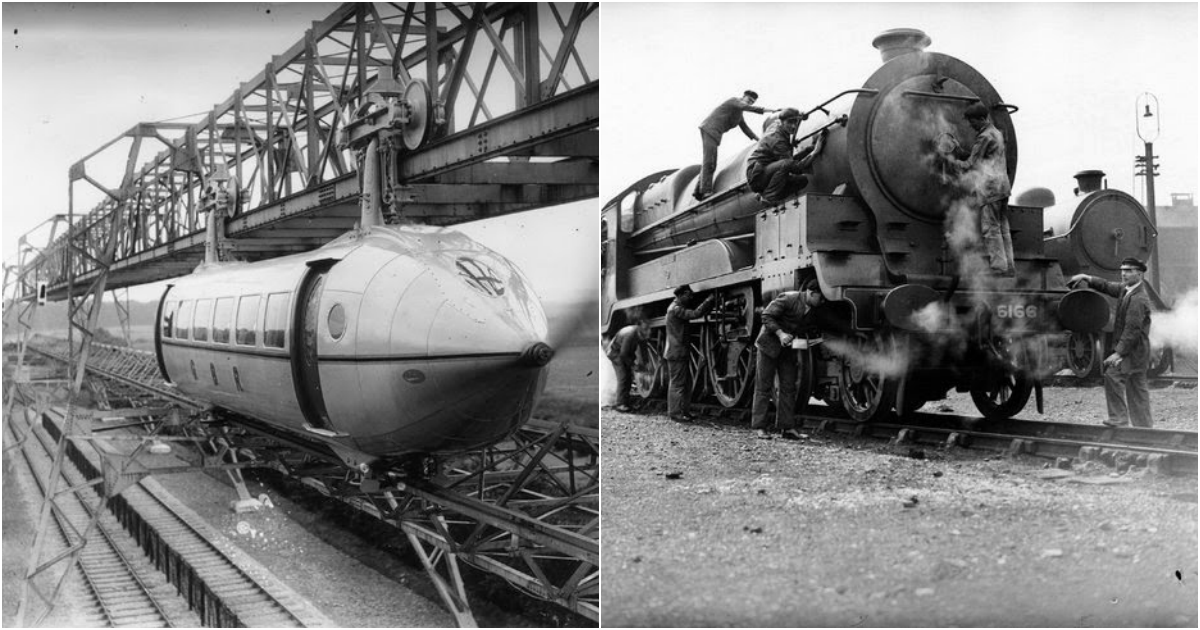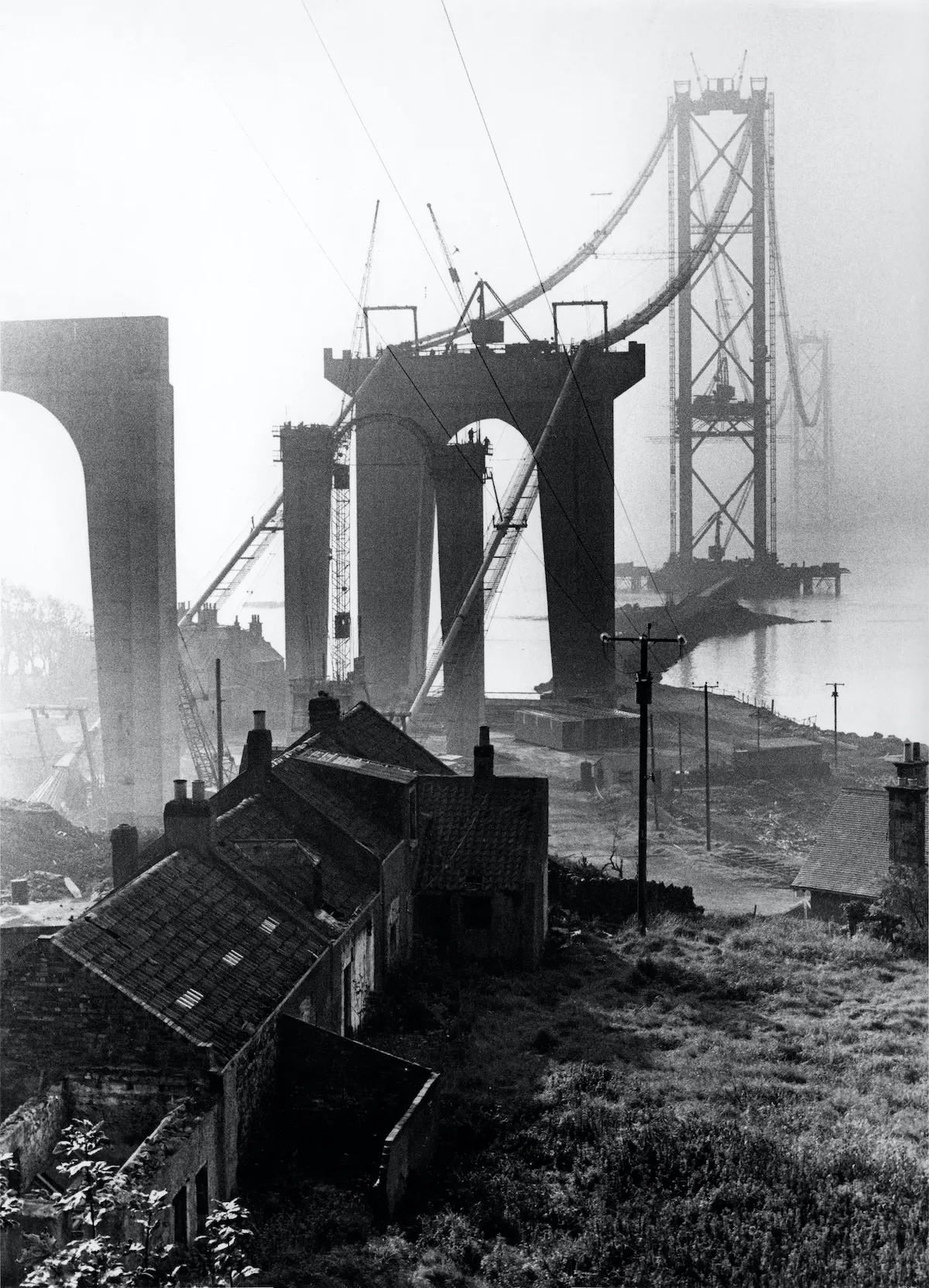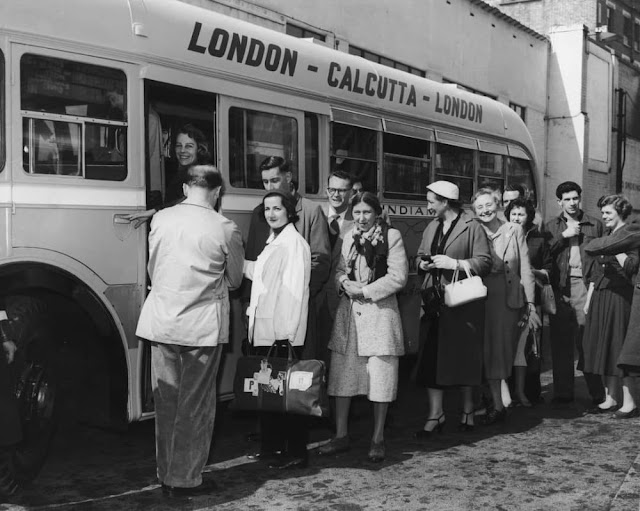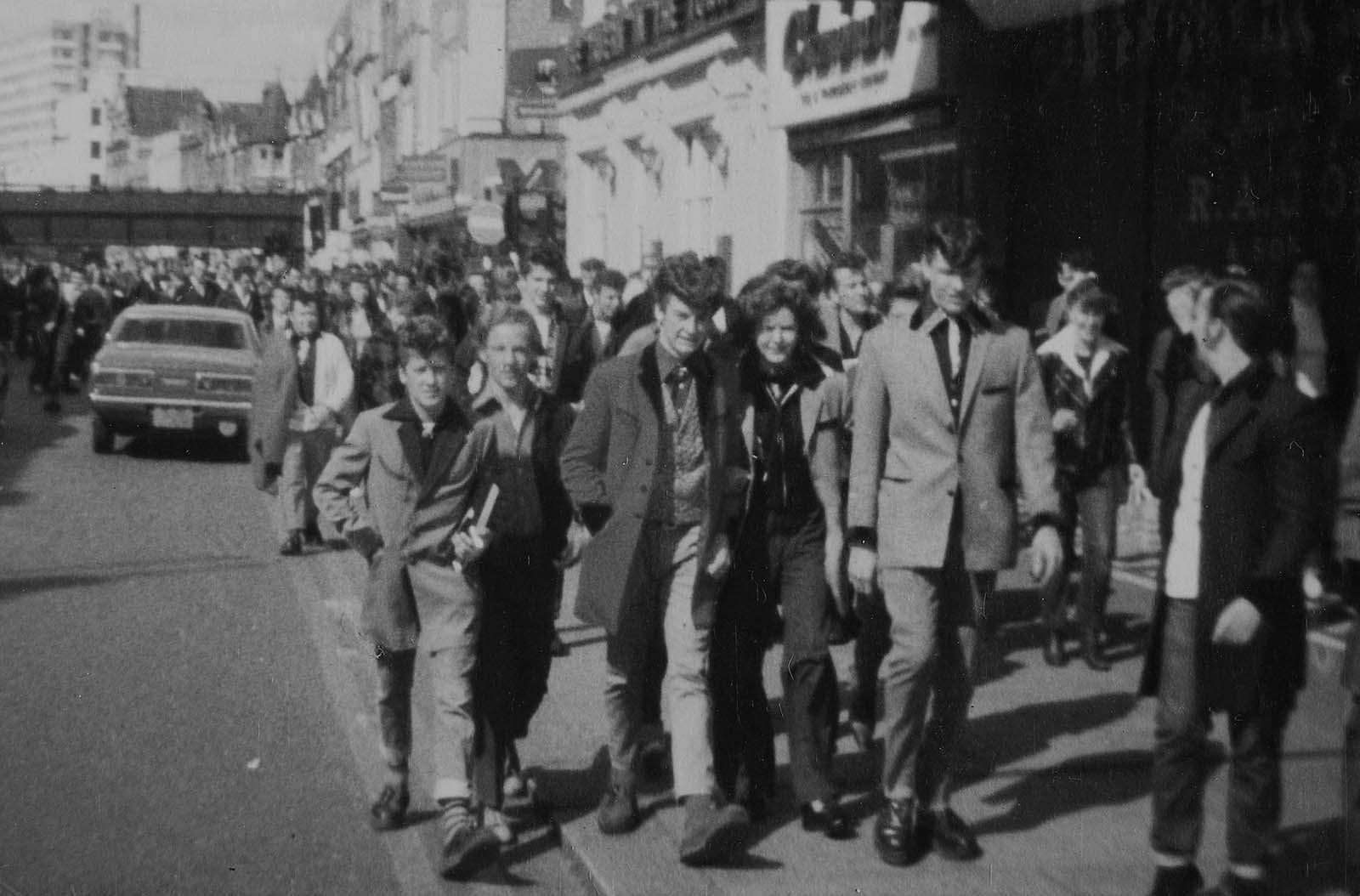 During the 1950s, a distinct and trendy subculture emerged in Britain. Young men of this era embraced a revival of Edwardian fashion, a style that had faded away four decades earlier.
During the 1950s, a distinct and trendy subculture emerged in Britain. Young men of this era embraced a revival of Edwardian fashion, a style that had faded away four decades earlier.
These individuals were famously known as “Teddy Boys.” Their distinctive appearance featured meticulously groomed hairstyles, long suit jackets, stylish waistcoats, slim neckties, and narrow trousers.
The Teddy Boy aesthetic served as a notable departure from the prevailing atmosphere of postwar austerity and frugality.
Remarkably, some working-class Teddy Boys were willing to invest more than two weeks’ worth of their wages into acquiring a meticulously tailored suit.
Notably, a portion of the Teddy Boy community became associated with gangs and garnered a reputation for hooliganism and delinquency.
An unfortunate incident in 1953, in which a 17-year-old lost his life due to a confrontation with a group of Teddy Boys, led to several clubs imposing bans on Edwardian clothing.
Despite these controversies, the captivating photographs from this era provide a glimpse into the mischievous antics of Teddy Boys as they roamed the streets and frequented dance halls in the vibrant heart of London.

Teddy Boys admiring the view on Clapham Common in 1954.
In post-war Britain, rationing continued to affect the fashion industry, and men’s tailors in central London devised a style based on Edwardian clothing hoping to sell to young officers being demobilized from the services.
However, the style—featuring tapered trousers, long jackets similar to post-war American zoot suits, and fancy waistcoats—was not popular with its target market, leaving tailors with piles of unsold clothing which, to recoup losses, were sold cheaply to menswear shops elsewhere in London.
While there had been some affluent adoption—”an extravagant upper-class snub to the post-war Labour Government and its message of austerity”—it was predominantly suburban working-class youth who adopted and adapted the look (“spiv” and cosh boy associations also hastened its middle-class rejection) and, around 1952, what became the “Teddy Boy” style began to emerge, gradually spreading across Britain.
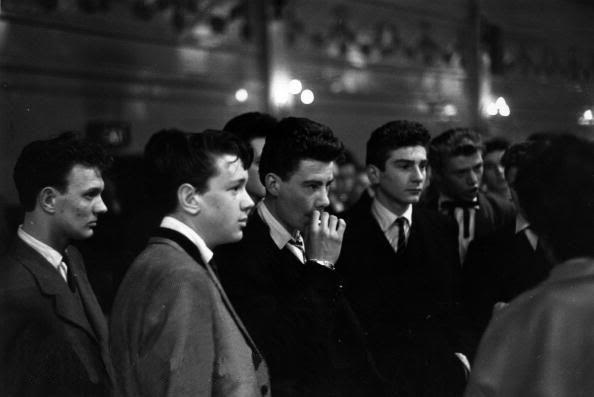
Teddy Boys at the Mecca Royal Dance Hall, Tottenham, Middlesex (North London) pictured in the Picture Post on 29th May 1954.
Teddy Boy clothing included drape jackets reminiscent of 1940s American zoot suits worn by members of Italian-American, Chicano and African-American communities, usually in dark shades, sometimes with a velvet trim collar and pocket flaps, and high-waist “drainpipe” trousers, often exposing the socks.
The outfit also included a high-necked loose-collared white shirt (known as a Mr. B. collar, because it was often worn by jazz musician Billy Eckstine); a narrow “Slim Jim” tie or western bolo tie, and a brocade waistcoat.
The clothes were mostly tailor-made at great expense, and paid through weekly installments.
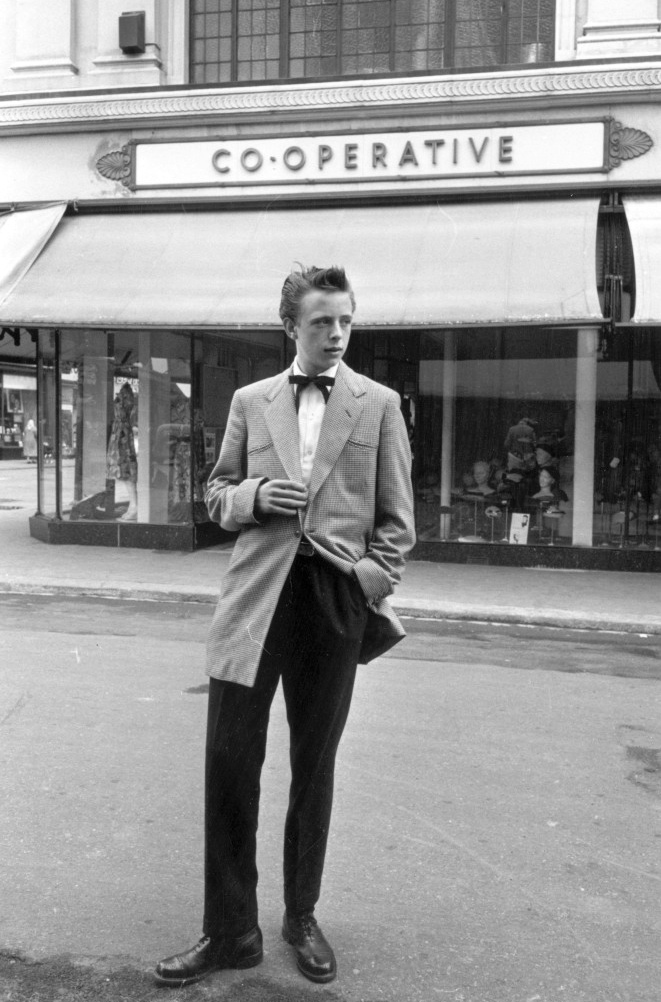
Picture Post, 29th May 1954. Frank Harvey pictured outside the Co-op in Tottenham, North London. Frank in later years ran a pet shop called “Alan’s Pet Supplies” at 75 Silver Street in nearby Edmonton. Apparently, when Frank ran the shop he had this photograph of him behind the counter.
Favored footwear included highly polished Oxfords, chunky brogues, and crepe-soled shoes, often suede (known as brothel creepers or beetle crushers).
Preferred hairstyles included long, strongly molded greased-up hair with a quiff at the front and the side combed back to form a duck’s arse at the rear.
Another style was the “Boston”, in which the hair was greased straight back and cut square across at the nape.
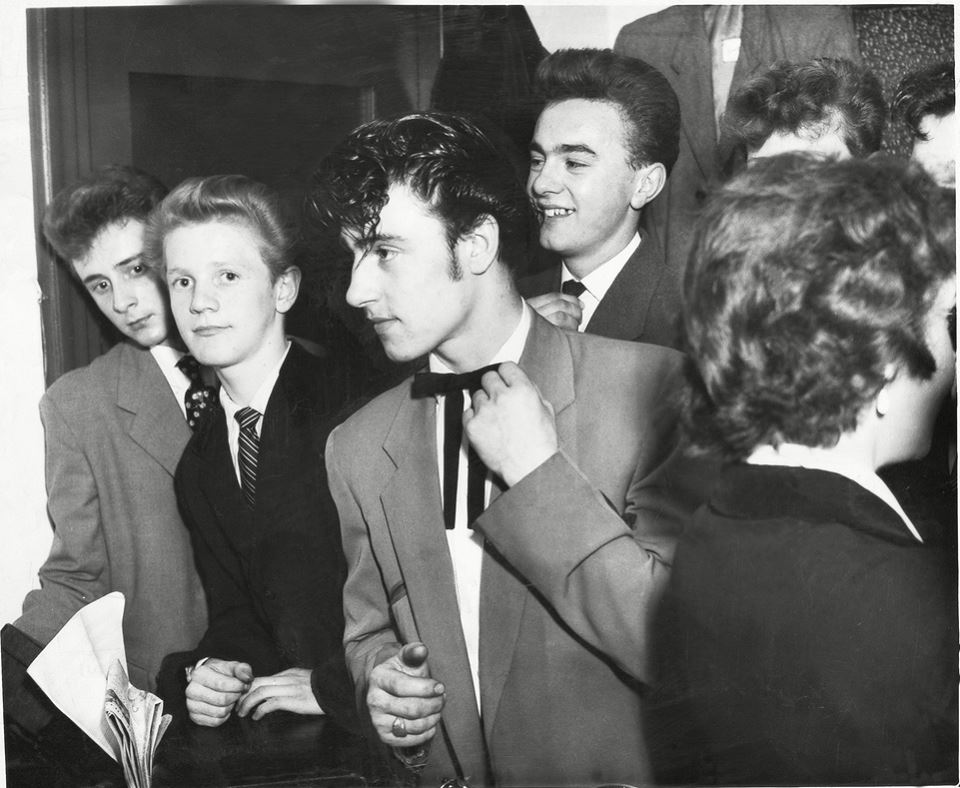
A Best Dressed Teddy Boy Competition at Nottingham in 1956.
Teddy Girls (also called Judies) wore drape jackets, pencil skirts, hobble skirts, long plaits, rolled-up jeans, flat shoes, tailored jackets with velvet collars, straw boater hats, cameo brooches, espadrilles, coolie hats, and long, elegant clutch bags.
Later, they adopted the American fashions of toreador trousers, voluminous circle skirts, and hair in ponytails.

Teddy Boys at Greenwich, London in 1956.
The Teddy Girls’ choices of clothes were not intended strictly for aesthetic effect; these girls were collectively rejecting post-war austerity.
They were young working-class women from the poorer districts of London. They would typically leave school at the age of 14 or 15 and work in factories or offices. Teddy Girls spent much of their free time buying or making their trademark clothes.
Their style originated from a head-turning, fastidious style from the fashion houses, which had launched haute-couture clothing lines recalling the Edwardian era.
“It was our fashion and we made it up,” declared one “Judie”, succinctly writing the mantra of the Teddy Girl ethos.
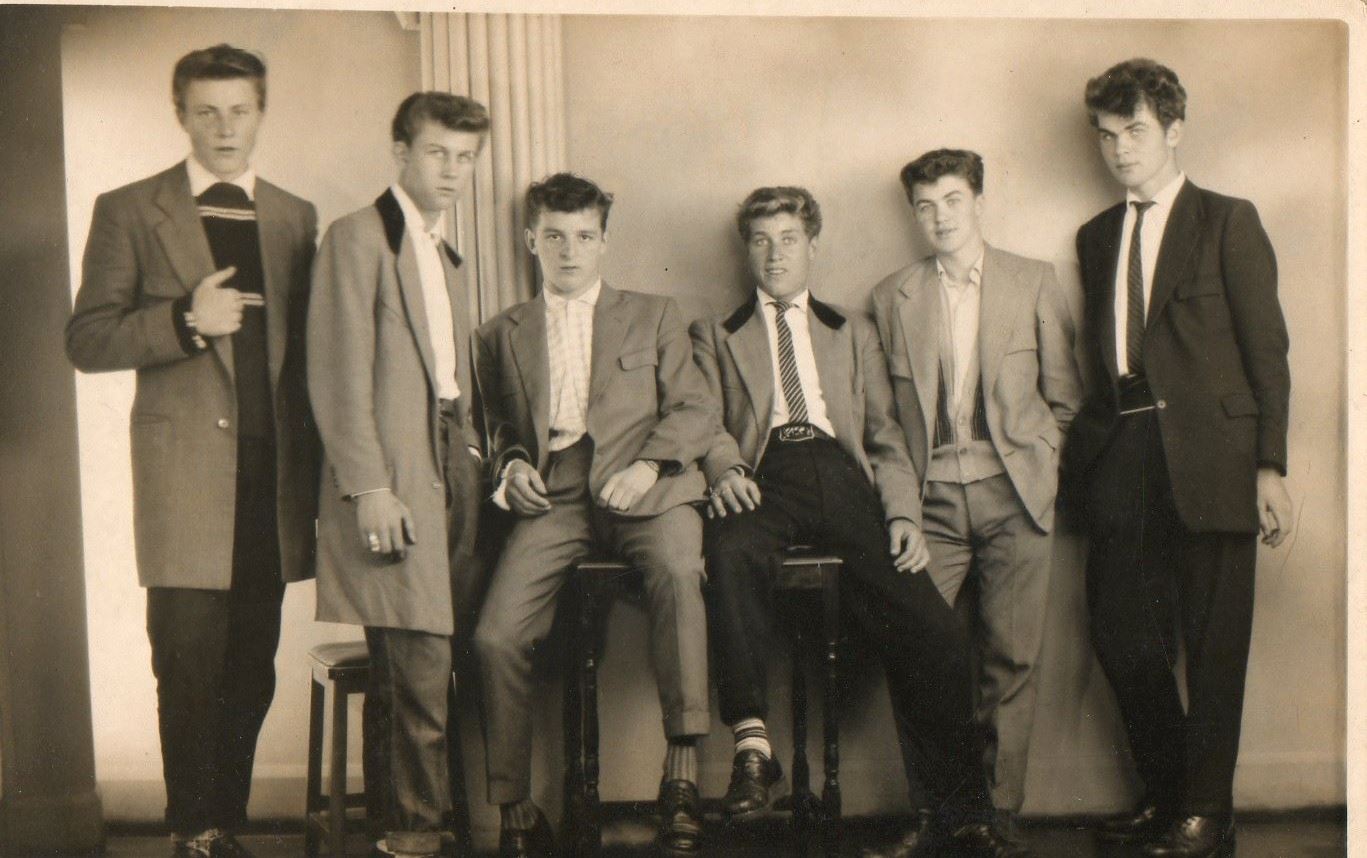
Portsmouth Teddy Boys, ca. 1955-56.
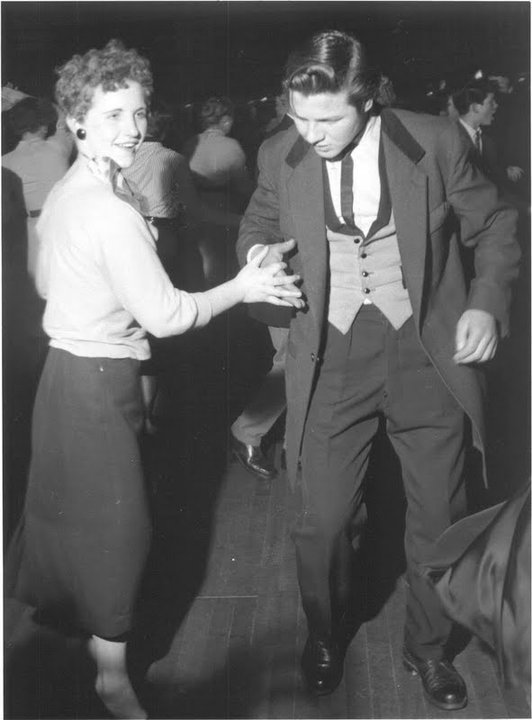
Teddy Boy and Girl.
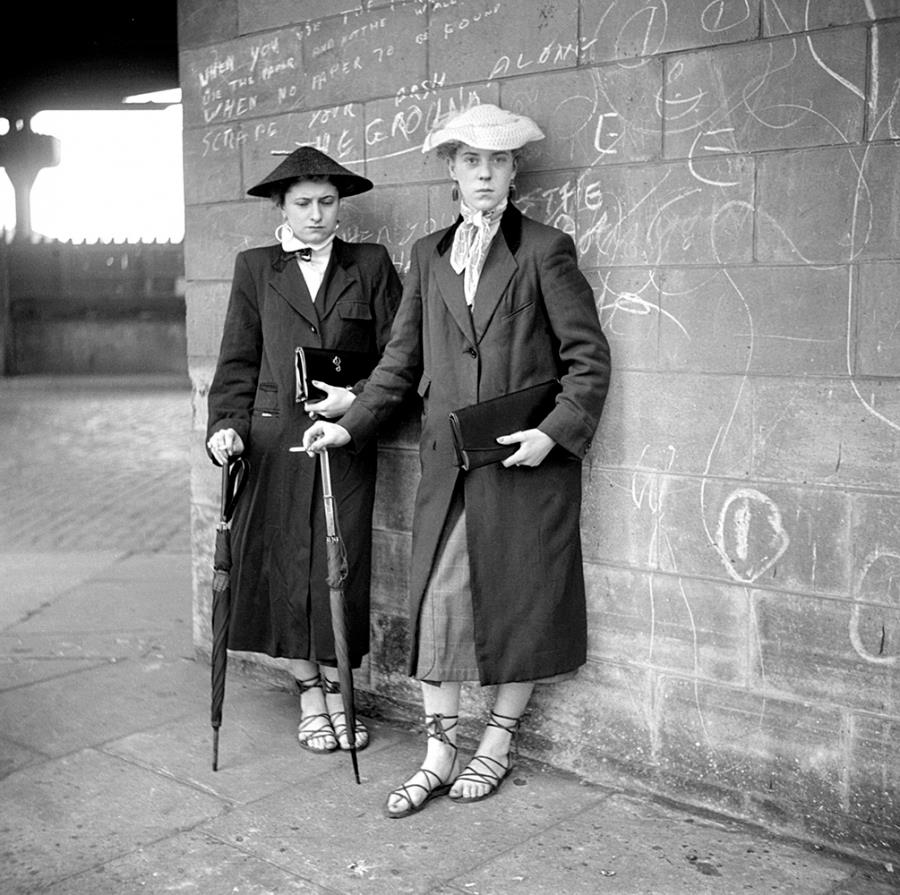
Photograph by Ken Russell January 1955 of Teddy Girls, Pat Wiles and Iris Thornton, aged 17 from Plaistow, showing off their lace up espadrilles.
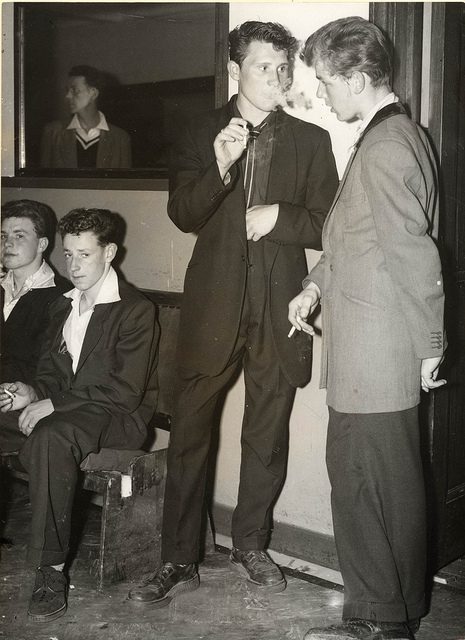
The Stag-Line at a Dance Hall. The Teddy Boy in the centre is wearing an Edwardian outfit, which may have cost him as much as £50.00 ( very expensive at the time). Note the Long Jacket with ‘Shawl’ collar and single link button fastening (nearly coming off), Drainpipe trousers, thick Crepe soled shoes (‘Creepers’) and parallel-striped ‘Slim Jim’ tie. The boy on the right has a ‘Tony Curtis’ haircut and is wearing crepe soled suede shoes. – July 1955.
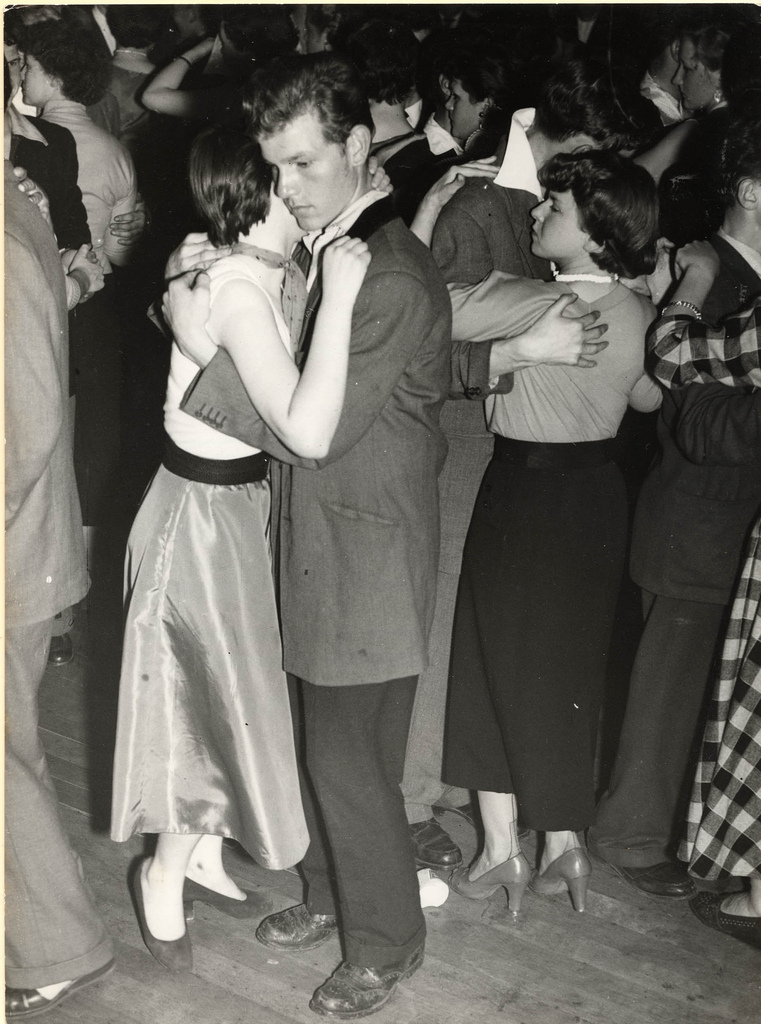
A Teddy Boy with his girl ‘Moon Dance’ at a Dance Hall – July 1955 – note the Drape Jacket with half back full velvet collar with 16-17″ turned up trousers and Brogue Shoes.
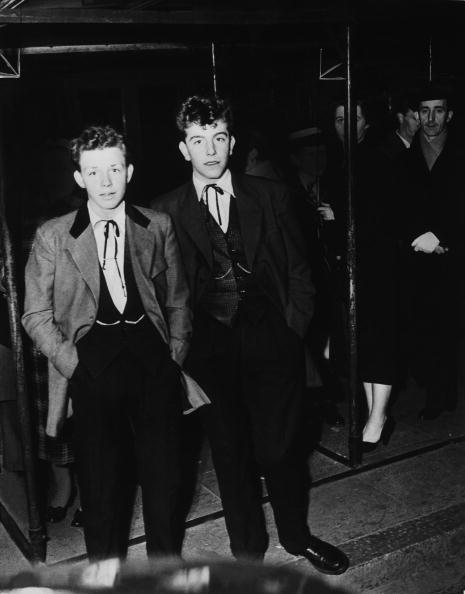
Two original 1954 Teddy Boys at Kingston upon Thames wearing Drape Jackets with 4″ wide lapels, silk patterned waistcoats and trousers with pleated fronts and 16″ bottoms with turn-ups.
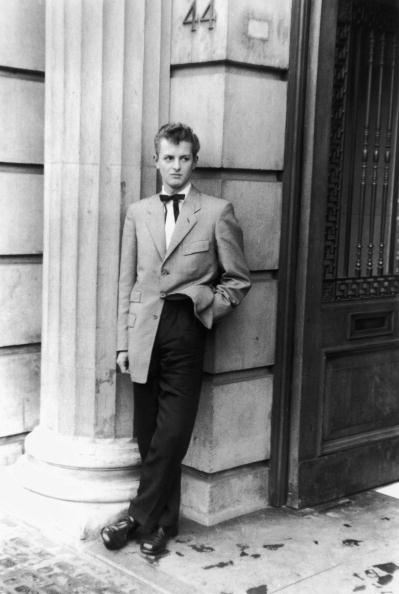
Alec Cruickshank, a clerk in a City of London shipping office poses ready to go into Mecca’s Royal Dance Hall, Tottenham, on 29th May 1954. Taken from the Picture Post article: “The Truth about Teddy Boys”.
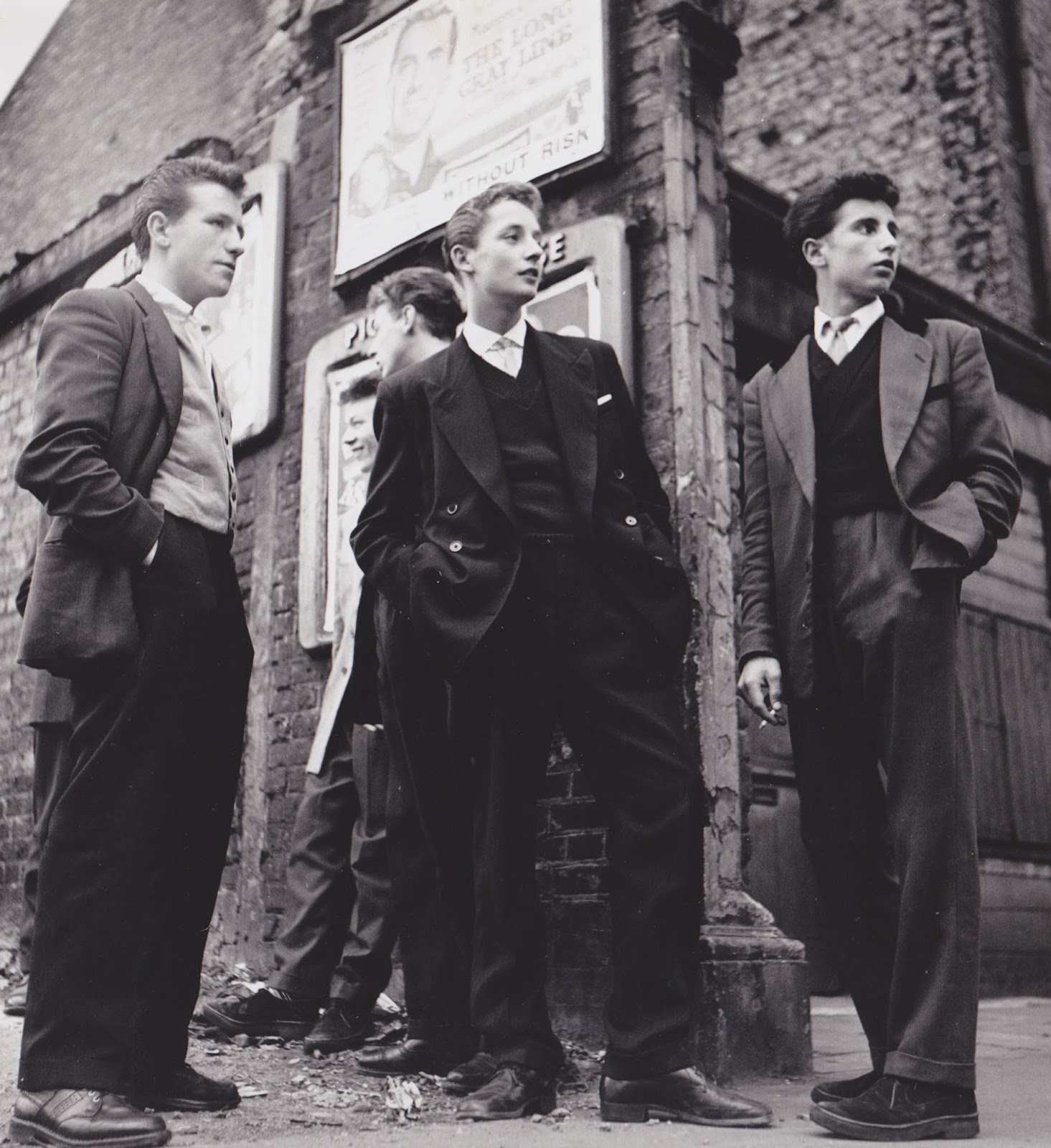
Teddy Boys gather outside a Picture House on the Old Kent Road, 1955.
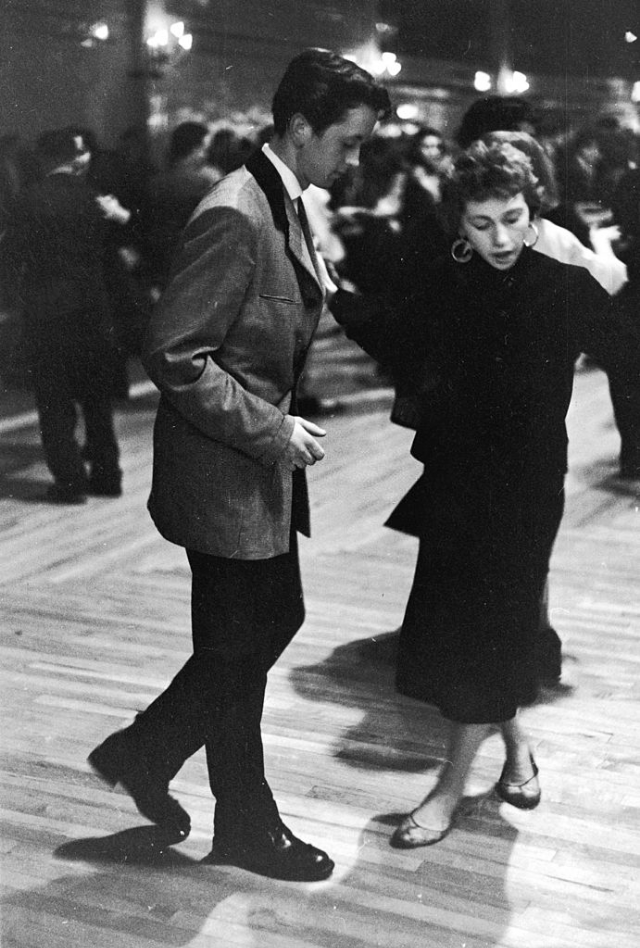
A ‘Teddy Boy’ dances with his girl at the Mecca Dance Hall, Tottenham, London, May 1954. Photo by Alex Dellow for Picture Post.
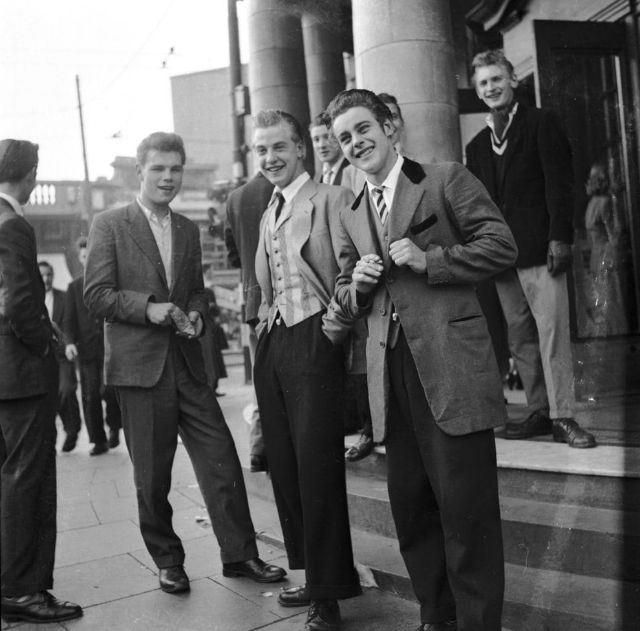
A ‘teddy boy’ shows off his suit to friends, 1955. Photo by Juliette Lasserre.
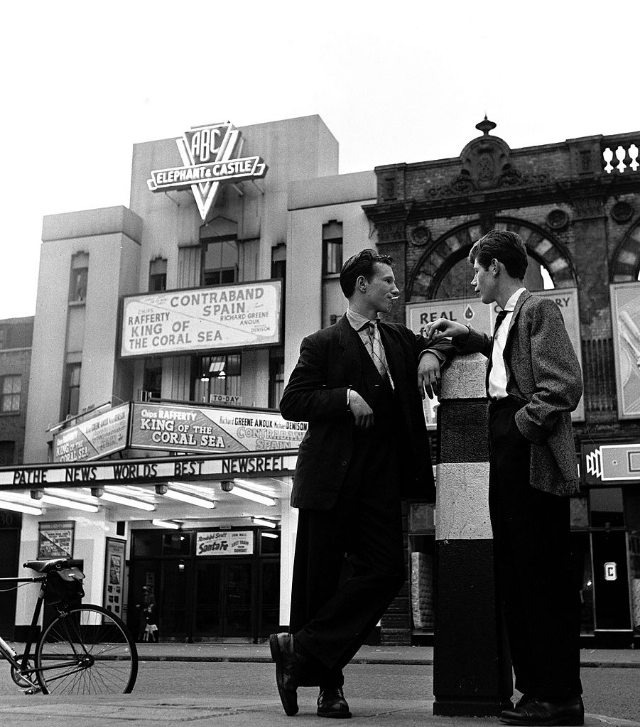
Teddy Boys hanging around on a South London street near the Elephant and Castle ABC cinema with nowhere to go, 1955. Photo by Popperfoto.
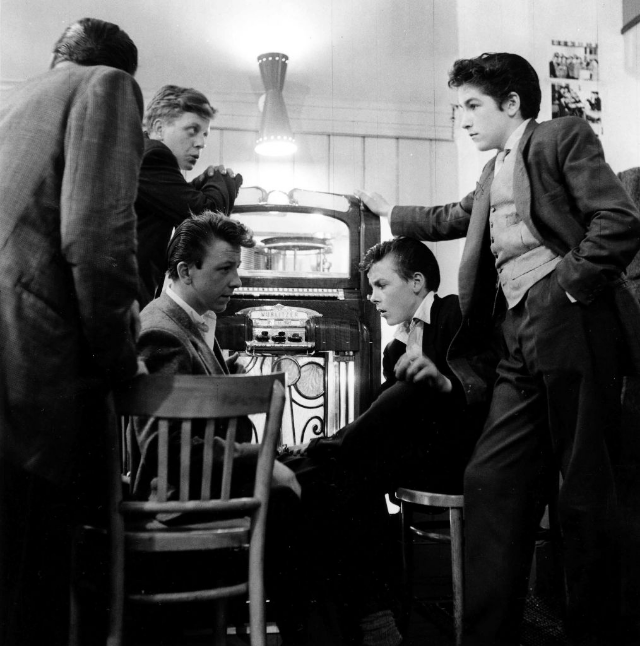
A group of Teddy Boys congregate around a jukebox, London, England, July 1955. Photo by Popperfoto.
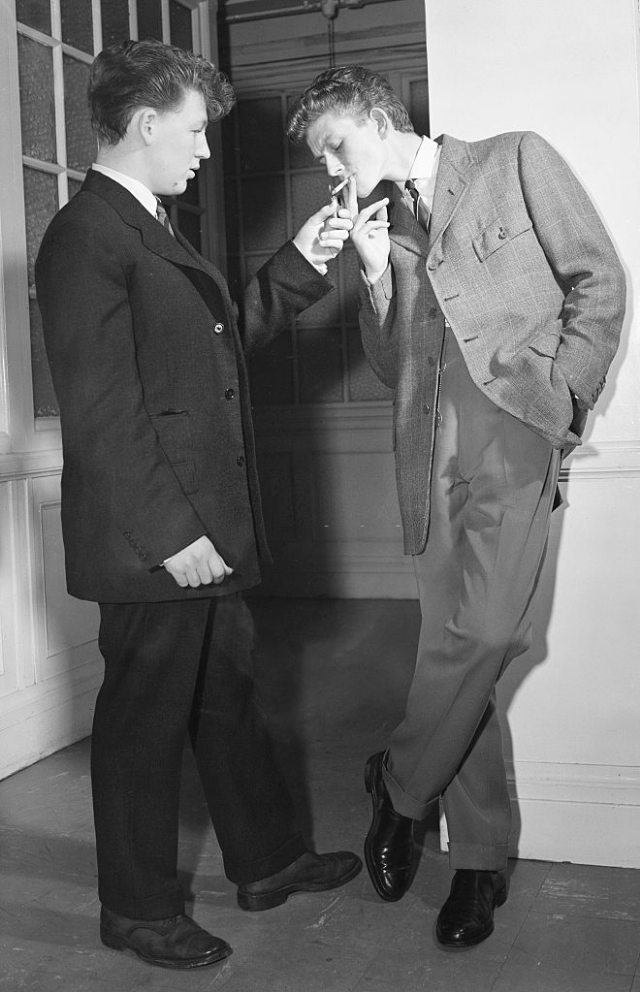
Youths modelling the latest fashion Edwardian suits, November 1955. Photo by Daily Mirror.
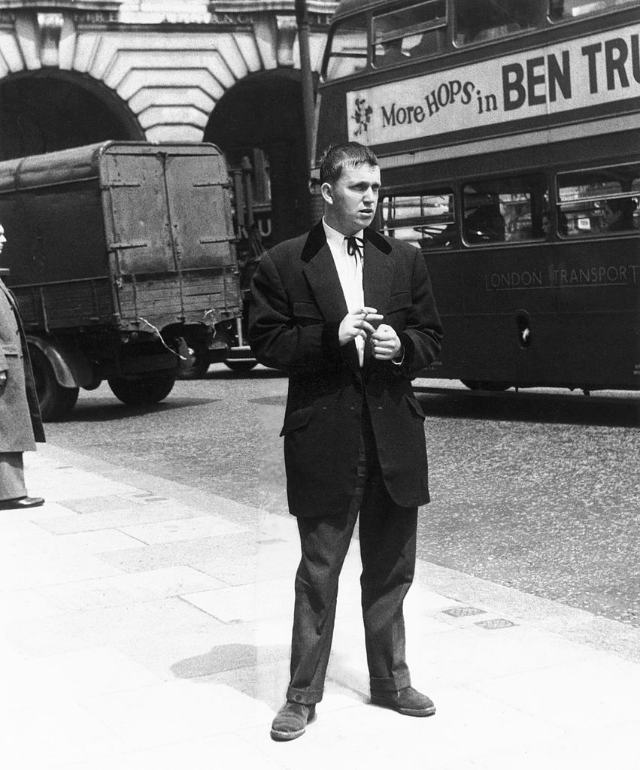
A British ‘Teddy Boy’ wearing the ‘drape’ suit, 1956. Photo by Daily Herald.
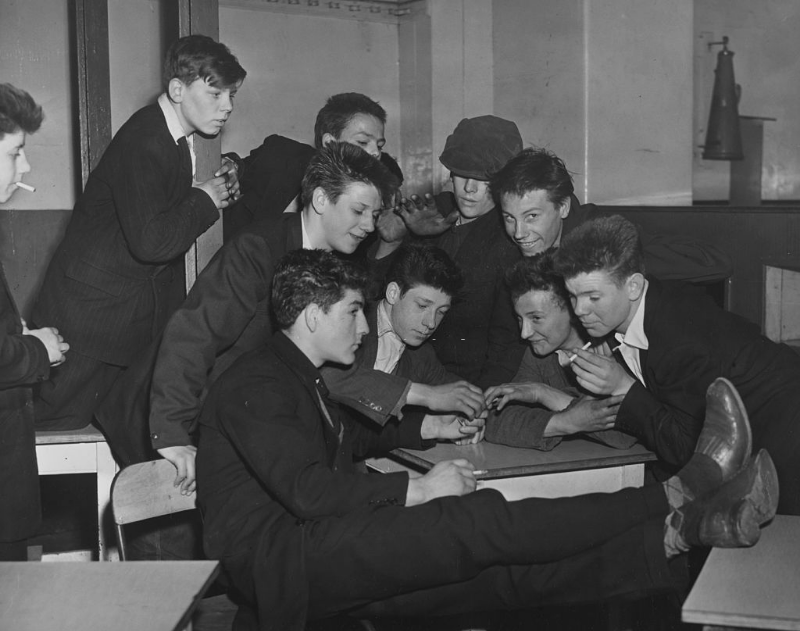
A group of Teddy Boys smoking cigarettes at the Rodney Youth Centre in Liverpool, April 1956 Photo by Daily Herald.
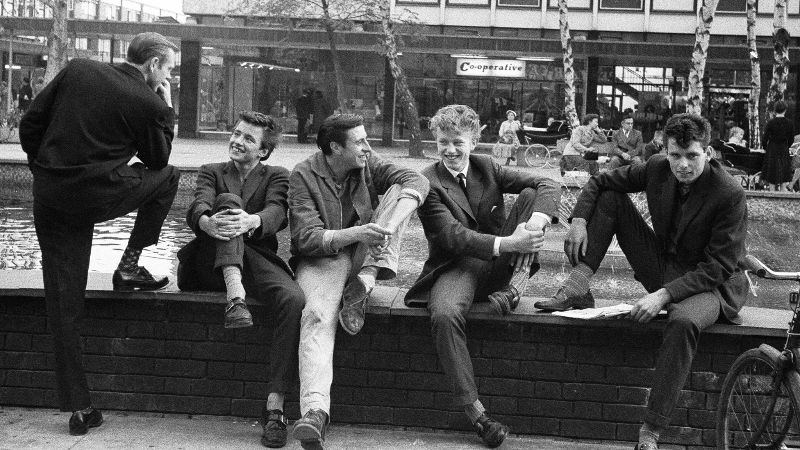
The boys of Stevenage in Hertfordshire beating their nightly battle with boredom in the town square, October 1959. Photo by Terry Fincher.
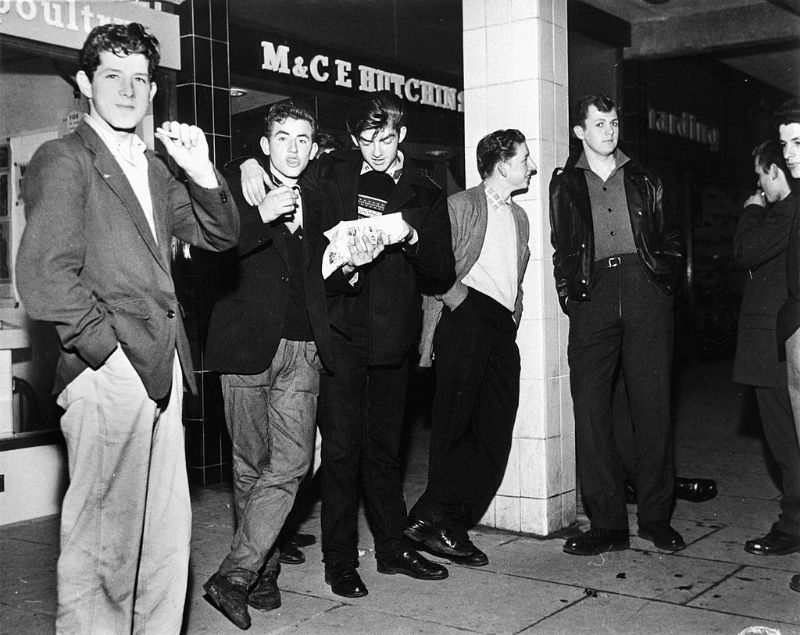
The fish and chip shop, the youths main meeting place in the new town of Newtown Aycliffe, Durham, October 1959. Photo by Finnigan.
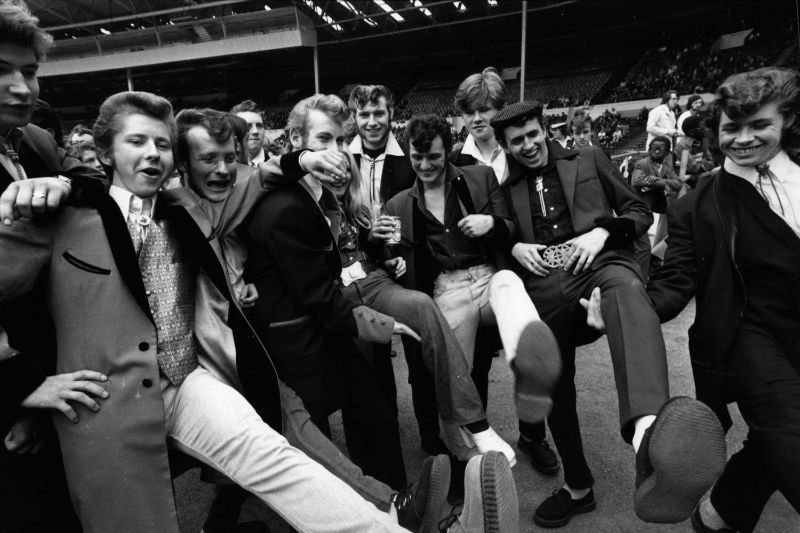
Young Teddy Boys posing at the Wembley Rock and Roll Festival. Photo by Evening Standard.
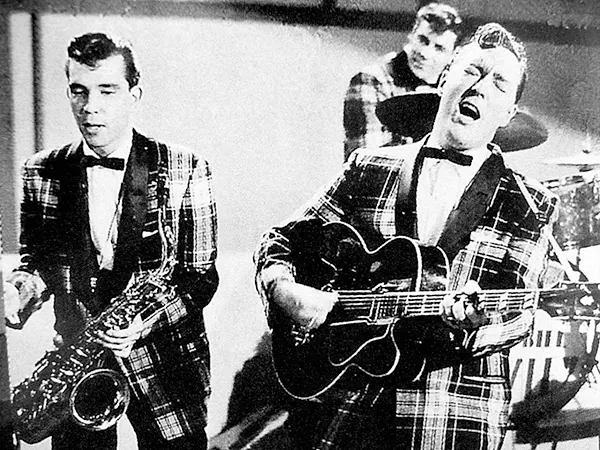
Vintage Photos of Dapper Teddy Boys and Girls From the 1950s

Vintage Photos of Dapper Teddy Boys and Girls From the 1950s

Vintage Photos of Dapper Teddy Boys and Girls From the 1950s

Vintage Photos of Dapper Teddy Boys and Girls From the 1950s

Vintage Photos of Dapper Teddy Boys and Girls From the 1950s
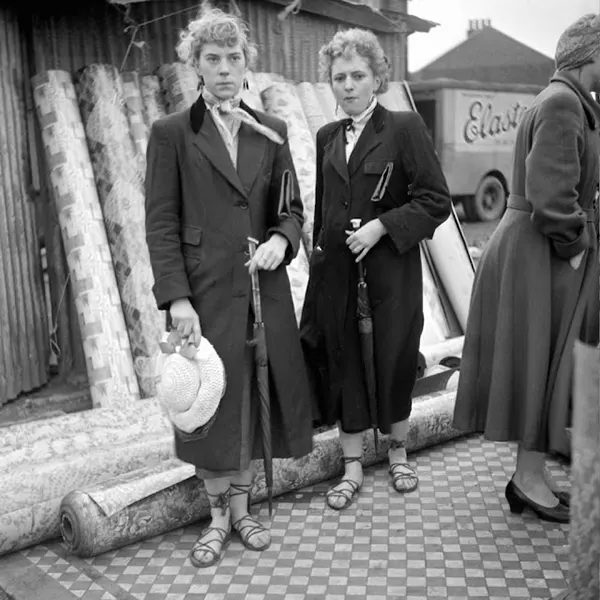
Vintage Photos of Dapper Teddy Boys and Girls From the 1950s
